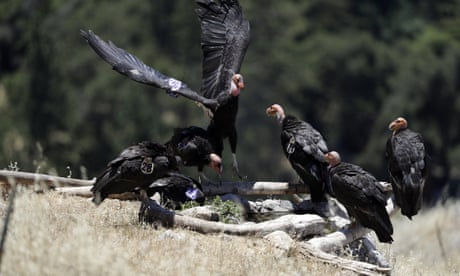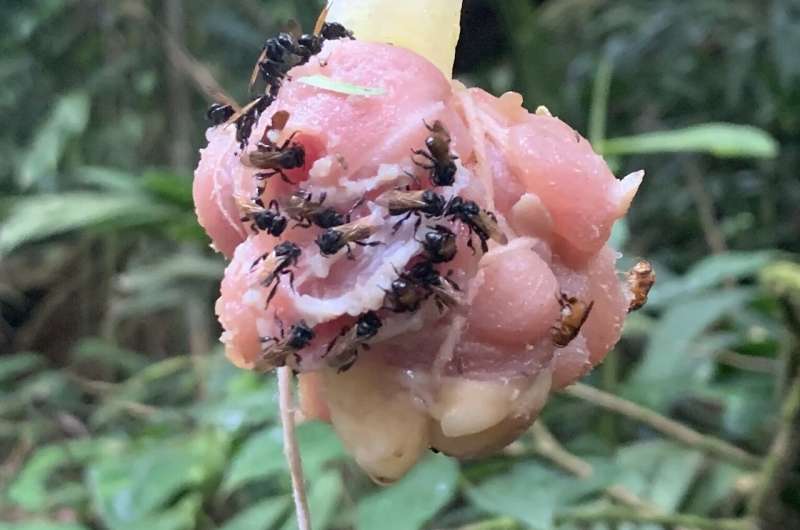Speaking in Van on Wednesday night, co-mayor Abdullah Zeydan said: "No one will even think of usurping your will anymore."
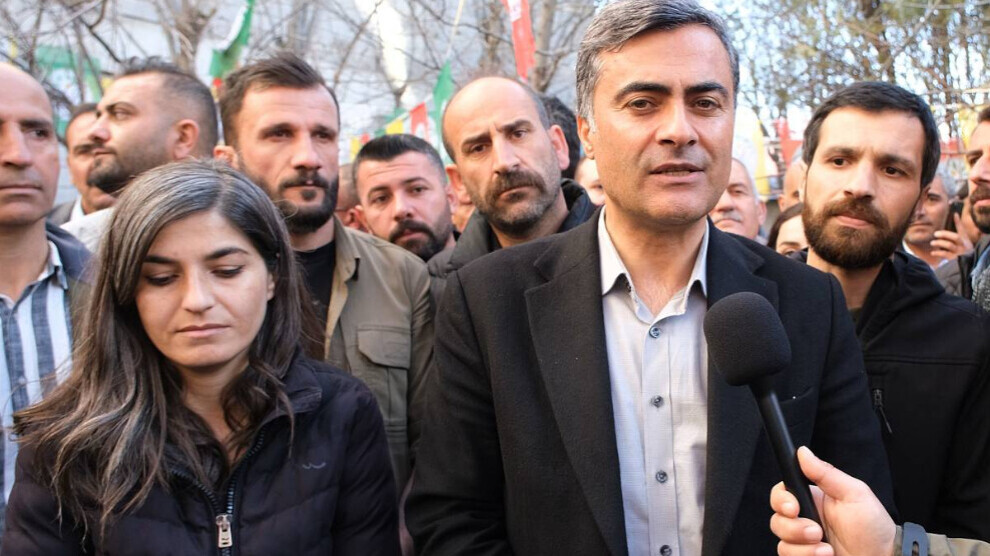
ANF
VAN
Thursday, 4 April 2024, 08:33
After the decision of the Supreme Electoral Board (YSK) to reinstate the Metropolitan Municipality co-mayor of the People's Equality and Democracy Party (DEM Party), Abdullah Zeydan, some one hundred thousand people flocked to Musa Anter Park to celebrate Van's victory.
They will never find the courage to usurp the people’s will again
Van Metropolitan Municipality co-mayor Neslihan Şedal said: “This victory, this resistance is yours, congratulations. After this resistance, who would dare to usurp our will, who would dare to usurp our institutions? You have been displaying great resistance for two days. The winners of this resistance were women and young people. Never again will anyone find the courage to usurp this will. This resistance was not just about winning the municipality. This resistance is a great gift to our friends in prison. This success is also their success. The winner was the spirit of the youth, the winner was the spirit of 'jin, jiyan, azadi'. "We resisted very hard and tomorrow we will clean our streets from the trustee's garbage."
Zeydan: you showed how the Kurdish people have honor
Van Metropolitan Municipality co-mayor Abdullah Zeydan said: “Van is a place of honour and dignity. How happy we are that we are the children of honorable people like you. We said something to the vultures who wanted to collapse against the will of the people in this square. Our people protected their honor and will against all attacks. We said that we would not sacrifice your honor to these vultures. You showed how honorable the Kurdish people are, despite all the pressure, despite all the dirty relationships, despite the promises of money. You gave your message to the whole world by winning 14 out of 14 municipalities. Despite the vultures, you revived the hopes of freedom between those four walls of our comrades, Demirtaş, Kışanak, Yüksekdağlar, Bekir Kayalar, Nazmi Gür, who have been on hunger strike for 125 days in the prisoons today. From now on, no one will even think of usurping your will. We salute and thank you for your honorable resistance. Now is the time to serve."
The resistance from all over Turkey, especially in Kurdistan, yielded results. The Supreme Electoral Board (YSK) gave the certificate of election to the elected DEM Party Metropolitan Municipality Co-Mayor Abdullah Zeydan.
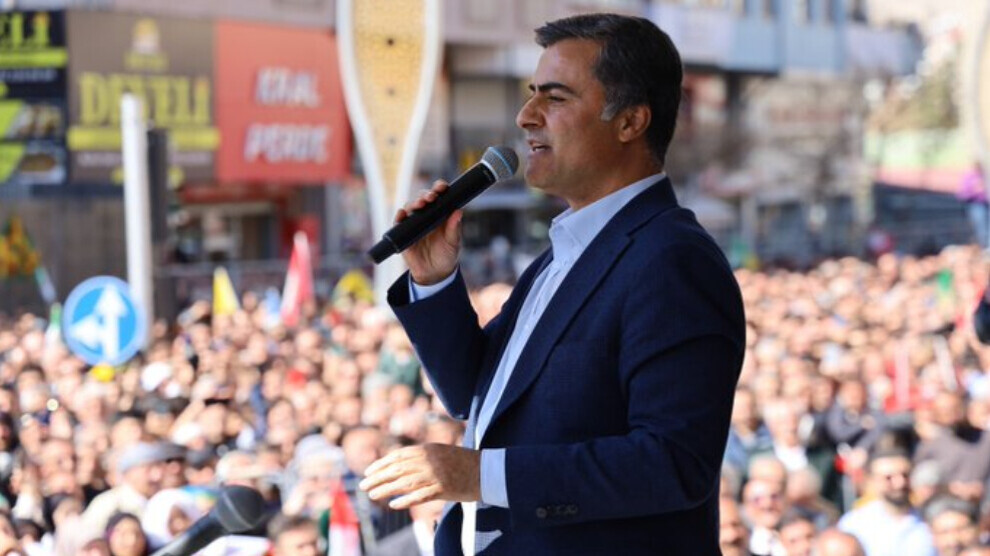
ANF
VAN
Wednesday, 3 April 2024
As a result of the resistance of the Kurdish people, their friends and democratic public opinion, the Supreme Electoral Board (YSK) was forced to return the certificate of election unlawfully granted to the AKP candidate to the democratically elected Metropolitan Municipality Co-Mayor Abdullah Zeydan of the DEM Party.
The DEM Party filed an objection to the YSK against the Provincial Election Board's decision to give the certificate of election to the AKP candidate. The YSK, which took the objection on its agenda today, decided to return the certificate of election to Zeydan.
Abdullah Zeydan commented on the YSK decision, saying, "We have been given back the certificate of election that we are entitled to. We salute the support and will of our people. We bow with respect in front of this upright stance and struggle of our people."
Background
The Peoples’ Democracy and Equality Party (DEM Party) achieved a historic victory in the local elections held on March 31, 2024, in Van. The people of Van province entrusted all fourteen municipalities, including the Metropolitan Municipality, to the DEM Party, establishing it as the leading party in the Provincial General Assembly by a significant margin. In the Metropolitan Municipality, where the DEM Party received 55% of the vote and the AKP just 27%, elected DEM Party Co-Mayor of Van Metropolitan Municipality, Abdullah Zeydan, has been denied office and replaced by the AKP candidate.
The illegal action against Zeydan was taken despite the fact that he completed all requisite legal procedures and successfully secured candidacy approval from the Supreme Election Board (YSK) after rigorous scrutiny. He garnered substantial support from the people of Van and was duly elected together with Neslihan Şedal.
However, merely five minutes before the close of business on Friday, March 29, 2024, and a mere two days before the election, the Ministry of Justice, via an administrative decision and correspondence, contested the legal credentials of Zeydan, who had been restored his full civil rights by a court decision when released from prison in 2022. Following Friday’s administrative decision and objection letter, which was essentially a directive, the authorized prosecutor's office resubmitted the matter to the court that had issued the decision to restore his civil rights two years ago. That same day, the court revoked their own previous decision and dismissed Zeydan’s civil rights application; and they pre-emptively informed the YSK prior to the formalisation of their new reversed decision, thus curtailing the right to object and appeal.
The very court that had initially ruled in favor of restoring the civil rights of Abdullah Zeydan reversed its decision.
The unlawful action against Zeydan was met with protests, starting from Van and spreading to the entire Kurdish region. People have been taking to the streets for two days in protest at the usurpation of the will of the people of Van. In addition to the Kurdish politics and population, democratic circles from Turkey and abroad also expressed their support for Zeydan against attempts to deny the will of the Kurdish voter
Resistance in Van: We will continue our struggle until we get results
Speaking in Van, Tuncer Bakırhan appealed to the government, saying, “As long as you usurp the will of this people, you are doomed to lose,” Tülay Hatimoğulları said that they would continue their struggle until the return of their mandate.
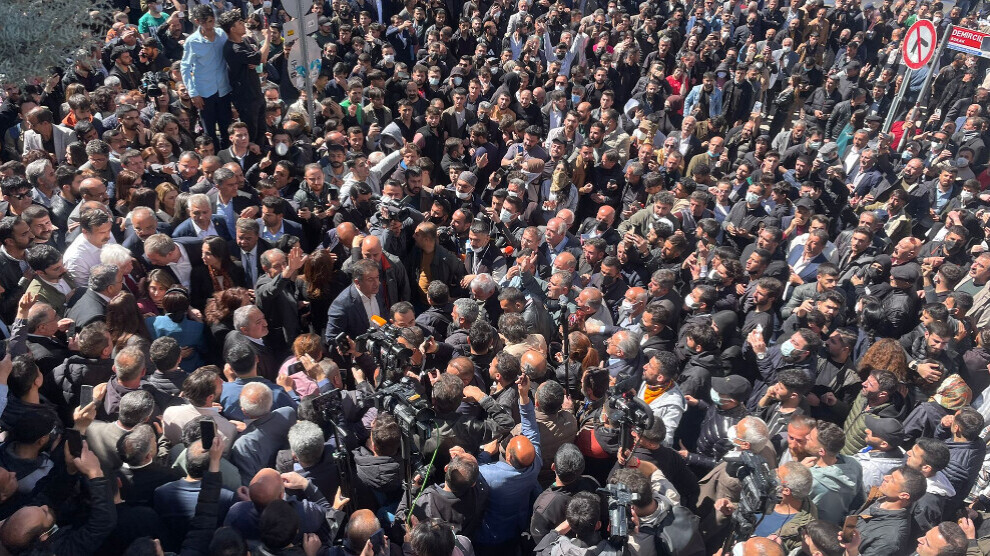
VAN
Wednesday, 3 April 2024
Protests continue in the Kurdish province of Van where the democratically elected co-mayor of the DEM Party was stripped of his civil rights by order of the Turkish government and unlawfully replaced by the AKP candidate.
The Peoples' Equality and Democracy Party (DEM Party) held its Central Executive Committee (MYK) meeting at the Confederation of Public Employees' Trade Unions (KESK) building in Van. After the meeting, a march started in in the city centre. Tens of thousands of people participated in the march and frequently chanted slogans such as "Abdullah Zeydan is our honour", "We will win by resisting" and "Rights, law, justice". After the march, a statement was made at Feqiyê Teyran Park.
Addressing the people here, DEM Party Co-Chair Tuncer Bakırhan said, "As I said before, Van is the heart of the Kurds and Kurdistan. Van, with its honourable stance, has given the answer that the Kurdish demands for freedom and democracy cannot be eliminated by oppression, persecution and trustee system, on Newroz Day, in the elections and today in this field. We feel honoured whenever and wherever we hear Van's name. Those who appointed trustees to our will for two terms are now trying to usurp the will of the people of Van again with a conspiracy, political and judicial coup. We will not allow this. Neither their political coups nor their judicial coups will succeed as long as you stand together here with honour despite all the pressure, batons, guns and pepper gas. We promise you that we will protect all the 14 municipalities we have won here."
Bakırhan emphasised that no one can usurp the will of the people of Van and continued his speech as follows: "The calculations made in Ankara, in those dark depths, are doomed to be shattered by hitting the Newroz field and the Castle in Van. They think that we will swallow this injustice. We call on them to deliver the mandate to the people of Van. I would like to appeal to the YSK (Supreme Election Board); do not be an instrument to this political coup. You authorised Abdullah Zeydan with your own hand and approved his candidacy. Now stand by your decision. Please do not remain under the pressure of the government, which has received the necessary response from the people of Turkey in this election. I hope and wish that you will not ignore the will of this people.”
Bakırhan further stated the following: “Another call is for the AKP candidate. If you are Kurdish, if you are a human being, if you are a believer, if you are a person of this land, do not let yourself be deceived. Do not accept the mandate. Tomorrow you will have to lower your head when you walk among the people of Van, on the streets of Van. Do not stand by the AKP-MHP government that will usurp the will of this people. Kurdish people are honourable. They do not forget those who do good, those who do right and those who are not a tool of conspiracy games. If you want to live with your people in your own region with a conscience, honourably and with your head held high, do not lay hands on to the mayor’s office, which is the right of Abdullah Zeydan and Neslihan Şedal.
The election in Van is being discussed all over Turkey. For the first time, Turkey has formed a great alliance against this unjust and unlawful decision against Van. We convey our thanks to the political parties, leaders, democratic mass organisations, labour and professional organisations who embrace Van and stand behind the will of the people of Van. Be sure that for the first time, the labourers and oppressed people of Turkey are in solidarity with the people of Van in a strong way. Do not worry, you are not alone. The labourers and the poor all over Turkey are with you. Once again, I call out to the AKP government; as long as you usurp the will of this people, you are doomed to lose. On 31 March, you lost. Turn from this wrong path, this is not a right path. It will lead nowhere. Your miscalculations have disappeared here today as they did yesterday."
Speaking after, DEM Party Co-Chair Tülay Hatimoğulları stated the following "While we are speaking here, we are addressing not only you but also 85 million people living in Turkey. The YSK, which approved the candidacy of Abdullah Zeydan, reported a problem with his candidacy 48 hours before the elections, 5 hours before 17.00 on Friday, and this problem is communicated to the AKP and AKP's candidate before it is communicated to the DEM Party. They plotted against us while the elections were still taking place. However, you will foil their conspiracy. We appeal to the YSK; the Provincial Electoral Board has taken this decision with a 2 to 1 vote, that is, with an annotation. This morning, our esteemed lawyers and party officials conducted a study and submitted a very broad objection to the YSK. Until this objection is officially finalised, until our objection is accepted, the DEM Party will continue to put forward a democratic struggle in the strongest way together with our people and continue this struggle until Abdullah mayor is given his mandate. We held our MYK meeting here in Van today. All of our MYK group, our Party Assembly, and a significant majority of our MPs will remain in Van until this decision is approved positively. We will carry out this struggle together with the people of Van."
After the statement, thousands of people marched towards Van Courthouse where the Provincial Election Board is located.
The police once again attacked the people as they marched along the Maraş Street in the city centre shouting slogans.
Anti-riot vehicles, gas bombs and rubber bullets were used in the attack and MPs were also targeted. While the public was seriously affected by the intensive use of gas, many protesters were subjected to police violence. Clashes spread to all side streets.
Today is the day of solidarity, said the KNK, calling on members of national parliaments, governments, trade unions, civil society organizations, bar associations and political parties to take a stand against flagrant lawlessness.
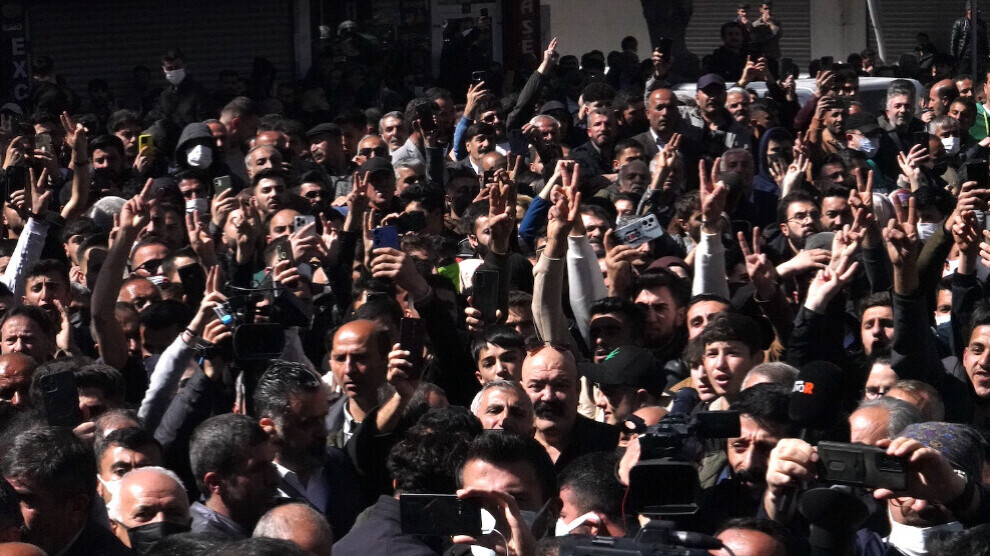
ANF
NEWS DESK
Wednesday, 3 April 2024
Kurdish politician Abdullah Zeydan, who ran as co-mayor with Neslihan Şedal for the DEM party and won the election with a large majority, was stripped of his civil rights by order of the Turkish government and replaced by the AKP candidate who was given the certificate of appointment as mayor. The protests in Van and many other cities against the appointment of AKP candidate Abdulahat Arvas as mayor continue.
The Executive Council of the Kurdistan National Congress (KNK) released a statement calling for solidarity against the Erdoğan regime’s flagrant lawlessness that ignores the will of the people.
Noting that the Peoples' Equality and Democracy (DEM) Party achieved a significant victory in the local elections held in Turkey on March 31, 2024, KNK said that the DEM Party’s electoral strategy, in which its voters supported opposition CHP candidates, prevented Turkish president Recep Tayyip Erdoğan’s ruling AKP-MHP alliance from winning the municipalities of major cities like Istanbul and Ankara. The DEM Party itself won 81 municipalities in Kurdistan.
The result in Van province stood out. DEM Party candidates won the Van Metropolitan Municipality and all fourteen district municipalities. The DEM candidate for Van Metropolitan Municipality, Mr Abdullah Zeydan, won 55.5% of the vote. The AKP candidate came in a distant second with just 27.2% of the vote. However, per the Justice Ministry’s order, the Van Provincial Election Board ruled on April 2 to hand the “certificate of election,” a document that signifies the elected candidate’s right to govern, to the second-place AKP candidate.
“The legal reasoning behind this move was extremely faulty. Mr. Zeydan applied on time, received his appeal documents, finalized the restitution of his divested rights, and campaigned for months. It is obvious that this is a political attack on the right of voters in Van to choose their representatives and has nothing to do with the law,” said the KNK statement, which further included the following:
“The Erdoğan regime has now trampled on the will of the Kurdish people and the voters of Van for the third time in the past 10 years. It is well past time for the dictatorial practices of the fascist AKP-MHP regime to come to an end.
The Kurdish people and their allies are on the front lines of the global fight for democracy today. The international community must not let them do so alone. Standing together with the DEM Party against this coup can help move Turkey towards democracy and will signal to autocrats everywhere that stealing elections has consequences.
The UN, the Council of Europe and the EU, of which Turkey wants to become a member, must support the Kurdish people and the principles of democracy in Turkey against Erdoğan’s authoritarianism. They must not waste time in taking action. There have been frightening signs since yesterday that special paramilitary units are being deployed in Kurdistan to prevent the Kurds from standing up for their democracy and their fundamental civil rights. These units were responsible for thousands of assassinations and disappearances of Kurdish politicians, activists, and civil society leaders in Kurdistan in the 1980s and 1990s. Curfews and travel bans are being imposed to prevent information from coming out of the region. We fear that they may return to such tactics again.”
The statement concluded: “We call on members of national parliaments, governments, trade unions, civil society organizations, bar associations and political parties: Today is the day of solidarity. Please take a stand against the Erdogan regime’s flagrant lawlessness that ignores the will of the people. Democratic societies must stand together with the DEM Party, Kurdish voters, and all defenders of democracy in Turkey and Kurdistan.”








